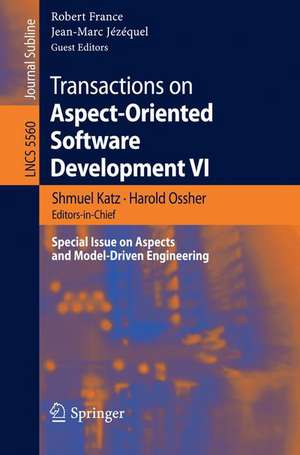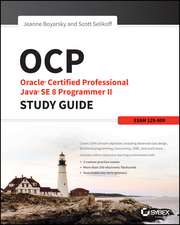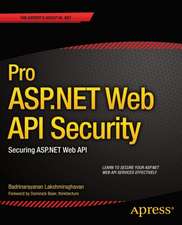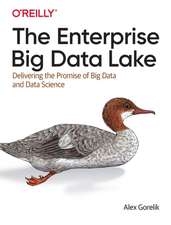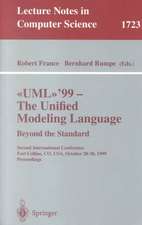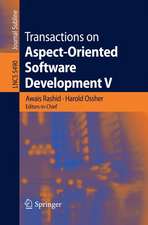Transactions on Aspect-Oriented Software Development VI: Special Issue on Aspects and Model-Driven Engineering: Lecture Notes in Computer Science, cartea 5560
Editat de Shmuel Katz Robert B. France Editat de Harold Ossher Jean-Marc Jezequelen Limba Engleză Paperback – 26 oct 2009
Din seria Lecture Notes in Computer Science
- 20%
 Preț: 1061.55 lei
Preț: 1061.55 lei - 20%
 Preț: 307.71 lei
Preț: 307.71 lei - 20%
 Preț: 438.69 lei
Preț: 438.69 lei - 20%
 Preț: 645.28 lei
Preț: 645.28 lei -
 Preț: 410.88 lei
Preț: 410.88 lei - 15%
 Preț: 580.46 lei
Preț: 580.46 lei - 17%
 Preț: 427.22 lei
Preț: 427.22 lei - 20%
 Preț: 596.46 lei
Preț: 596.46 lei -
 Preț: 449.57 lei
Preț: 449.57 lei - 20%
 Preț: 353.50 lei
Preț: 353.50 lei - 20%
 Preț: 1414.79 lei
Preț: 1414.79 lei - 20%
 Preț: 309.90 lei
Preț: 309.90 lei - 20%
 Preț: 583.40 lei
Preț: 583.40 lei - 20%
 Preț: 1075.26 lei
Preț: 1075.26 lei - 20%
 Preț: 310.26 lei
Preț: 310.26 lei - 20%
 Preț: 655.02 lei
Preț: 655.02 lei - 20%
 Preț: 580.93 lei
Preț: 580.93 lei - 20%
 Preț: 340.32 lei
Preț: 340.32 lei - 18%
 Preț: 938.83 lei
Preț: 938.83 lei - 20%
 Preț: 591.51 lei
Preț: 591.51 lei - 15%
 Preț: 438.59 lei
Preț: 438.59 lei - 20%
 Preț: 337.00 lei
Preț: 337.00 lei -
 Preț: 389.48 lei
Preț: 389.48 lei - 20%
 Preț: 607.39 lei
Preț: 607.39 lei - 20%
 Preț: 1024.44 lei
Preț: 1024.44 lei - 20%
 Preț: 579.30 lei
Preț: 579.30 lei - 20%
 Preț: 763.23 lei
Preț: 763.23 lei - 20%
 Preț: 453.32 lei
Preț: 453.32 lei - 20%
 Preț: 575.48 lei
Preț: 575.48 lei - 20%
 Preț: 585.88 lei
Preț: 585.88 lei - 20%
 Preț: 825.93 lei
Preț: 825.93 lei - 20%
 Preț: 763.23 lei
Preț: 763.23 lei - 17%
 Preț: 360.19 lei
Preț: 360.19 lei - 20%
 Preț: 1183.14 lei
Preț: 1183.14 lei - 20%
 Preț: 340.32 lei
Preț: 340.32 lei - 20%
 Preț: 504.57 lei
Preț: 504.57 lei - 20%
 Preț: 369.12 lei
Preț: 369.12 lei - 20%
 Preț: 583.40 lei
Preț: 583.40 lei - 20%
 Preț: 343.62 lei
Preț: 343.62 lei - 20%
 Preț: 350.21 lei
Preț: 350.21 lei - 20%
 Preț: 764.89 lei
Preț: 764.89 lei - 20%
 Preț: 583.40 lei
Preț: 583.40 lei - 20%
 Preț: 649.49 lei
Preț: 649.49 lei - 20%
 Preț: 341.95 lei
Preț: 341.95 lei - 20%
 Preț: 238.01 lei
Preț: 238.01 lei - 20%
 Preț: 538.29 lei
Preț: 538.29 lei
Preț: 332.06 lei
Preț vechi: 415.08 lei
-20% Nou
Puncte Express: 498
Preț estimativ în valută:
63.54€ • 66.52$ • 52.57£
63.54€ • 66.52$ • 52.57£
Carte tipărită la comandă
Livrare economică 07-21 aprilie
Preluare comenzi: 021 569.72.76
Specificații
ISBN-13: 9783642037634
ISBN-10: 3642037631
Pagini: 290
Ilustrații: XIII, 267 p.
Dimensiuni: 155 x 235 x 18 mm
Greutate: 0.41 kg
Ediția:2009
Editura: Springer Berlin, Heidelberg
Colecția Springer
Seriile Lecture Notes in Computer Science, Transactions on Aspect-Oriented Software Development
Locul publicării:Berlin, Heidelberg, Germany
ISBN-10: 3642037631
Pagini: 290
Ilustrații: XIII, 267 p.
Dimensiuni: 155 x 235 x 18 mm
Greutate: 0.41 kg
Ediția:2009
Editura: Springer Berlin, Heidelberg
Colecția Springer
Seriile Lecture Notes in Computer Science, Transactions on Aspect-Oriented Software Development
Locul publicării:Berlin, Heidelberg, Germany
Public țintă
ResearchCuprins
Special Issue: Aspects and Model-Driven Engineering.- Dynamic Weaving of Aspect-Oriented Executable UML Models.- On Language-Independent Model Modularisation.- Aspects across Software Life Cycle: A Goal-Driven Approach.- Aspect-Oriented Model-Driven Software Product Line Engineering.- Constraint-Based Model Weaving.- MATA: A Unified Approach for Composing UML Aspect Models Based on Graph Transformation.- Model-Driven Theme/UML.
Recenzii
From the reviews:
“This collection targets various facets of aspect-oriented software development (AOSD) in the context of model-driven engineering (MDE)--an approach in which models are used to drive the development throughout the entire life cycle of the software. … This systemic approach is still in the research stage, and the book contains these research reports. The book will be of interest to university research teams concerned with aspect orientation.” (Pierre Radulescu-Banu, ACM Computing Reviews, December, 2010)
“This collection targets various facets of aspect-oriented software development (AOSD) in the context of model-driven engineering (MDE)--an approach in which models are used to drive the development throughout the entire life cycle of the software. … This systemic approach is still in the research stage, and the book contains these research reports. The book will be of interest to university research teams concerned with aspect orientation.” (Pierre Radulescu-Banu, ACM Computing Reviews, December, 2010)
Textul de pe ultima copertă
The LNCS journal Transactions on Aspect-Oriented Software Development is devoted to all facets of aspect-oriented software development (AOSD) techniques in the context of all phases of the software life cycle, from requirements and design to implementation, maintenance and evolution. The focus of the journal is on approaches for systematic identification, modularization, representation and composition of crosscutting concerns, and evaluation of such approaches and their impact on improving quality attributes of software systems.
This volume, the sixth in the Transactions on Aspect-Oriented Software Development series, focuses on the theme of aspects and model-driven engineering. The seven papers included in this issue give an in-depth coverage of the following topics: methods and techniques supporting separation, composition, and evolution of aspects identified in different development phases; simulation of runtime weaving of aspects using aspect-oriented models; techniques for verifying and validating aspect-oriented models; AOM case studies that provide significant insights into how aspect-oriented modeling techniques can be applied across the development life-cycle; tool support for use of integrated AOSD and MDE techniques; and language support for aspect-oriented modeling.
This volume, the sixth in the Transactions on Aspect-Oriented Software Development series, focuses on the theme of aspects and model-driven engineering. The seven papers included in this issue give an in-depth coverage of the following topics: methods and techniques supporting separation, composition, and evolution of aspects identified in different development phases; simulation of runtime weaving of aspects using aspect-oriented models; techniques for verifying and validating aspect-oriented models; AOM case studies that provide significant insights into how aspect-oriented modeling techniques can be applied across the development life-cycle; tool support for use of integrated AOSD and MDE techniques; and language support for aspect-oriented modeling.
